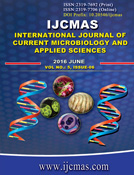


 National Academy of Agricultural Sciences (NAAS)
National Academy of Agricultural Sciences (NAAS)

|
PRINT ISSN : 2319-7692
Online ISSN : 2319-7706 Issues : 12 per year Publisher : Excellent Publishers Email : editorijcmas@gmail.com / submit@ijcmas.com Editor-in-chief: Dr.M.Prakash Index Copernicus ICV 2018: 95.39 NAAS RATING 2020: 5.38 |
A biointensive strategy was developed for management of bacterial wilt of tomato (Solanum esculentum Mill) caused by Ralstonia solanacearum using four compatible plant growth promoting microorganisms (PGPM),viz., Trichoderma parareesei, Pseudomonas fluorescens, Bacillus subtilis and Azotobacter chroococcum. Compatibility analysis among the PGPM showed positive interaction among themin vitro. The antagonistic potential of these PGPM was tested in vitro singly or in consortia and per cent inhibitions of target pathogenR. solanacearum were recorded and analyzed. The highest inhibition (91.10 %) of R. solanacearum was recorded against consortia of T. parareesei+ P.fluorescens + B.subtilis + A. chroococcum followed by T.parareesei+ P.fluorescens +B.subtilis(81.10 %) and P.fluorescens +B.subtilis + A.chroococcum (68.14%). Talc based bioformulations were prepared using the best three PGPM and their consortia for management of bacterial wilt by applying these as seed treatment, root treatment and soil application under pot conditionduring 2013-2015 crop seasons. Significantly highest reduction of bacterial wilt incidence (95.09 %) and highest yield (1.692 kg/plant) of tomato was recorded in treatment comprising of T. parareesei+ P.fluorescens + B.subtilis+ A.chroococcum. Correlation studies revealed negative correlation (-0.993) between bacterial wilt incidence and yield of tomato.
 |
 |
 |
 |
 |